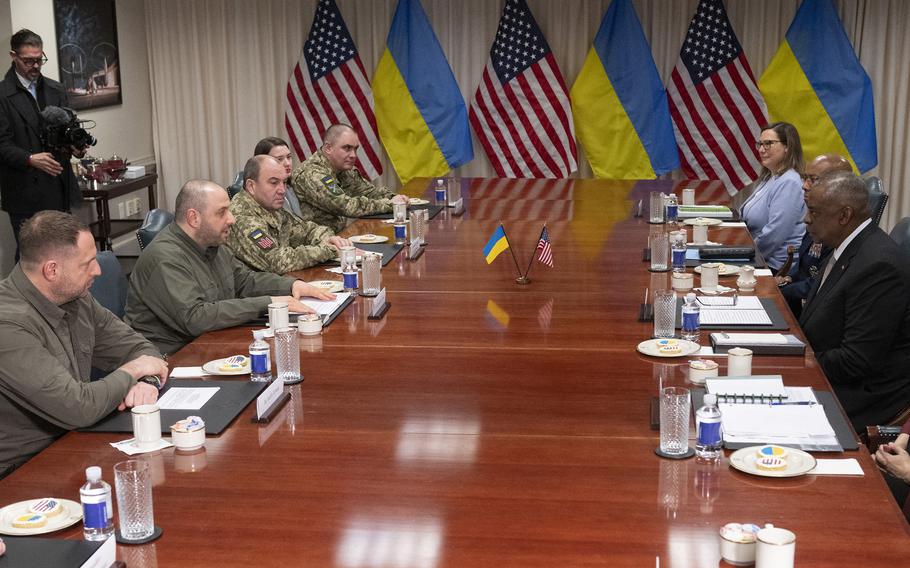U.S.
Ukraine funding fight stokes new fears over US reliability
Bloomberg News December 7, 2023

U.S. Defense Secretary Lloyd Austin (right) meets with Ukrainian Defense Minister Rustem Umerov (second left) at the Pentagon in Washington, D.C., on Wednesday, Dec. 6, 2023. (Roberto Schmidt, AFP/Getty Images/TNS)
WASHINGTON (Tribune News Service) — The latest jockeying between President Joe Biden and Republicans in Congress over Ukraine aid is fueling fresh concerns over Washington’s commitment to support Kyiv’s fight against Russia as the 2024 U.S. election nears.
On Wednesday, Biden accused Republicans of “playing chicken with our national security” as he delivered a speech, again urging them to approve $106 billion to support Ukraine and Israel. It was a message intended to heighten the urgency around U.S. support, which could run out in the coming months and leave Ukraine without crucial munitions to repel Russian forces.
“Republicans in Congress are willing to give Putin the greatest gift you could hope for and abandon our global leadership, not in just Ukraine but beyond that,” Biden said, referring to the Russian leader, Vladimir Putin.
Biden’s speech presents a gamble. By highlighting the urgency of congressional passage, the president was also drawing renewed scrutiny to the obstacles — unimaginable a few months ago — that U.S. leaders will face in helping Ukraine. Hours after Biden’s televised appeal, the Democrat-controlled Senate failed in its own gambit as Republicans blocked $66 billion in emergency Ukraine aid.
The U.S. infighting may fan fears in European and Asian capitals looking to U.S. leadership and support amid more aggressive Russian and Chinese actions. For some observers, tying domestic political demands to a pressing foreign policy priority sets a disturbing precedent — especially when the U.S. is ostensibly supporting a democracy against an aggressor that seeks to undermine American influence.
“There will be a sense of shock across the world for anyone that relies on U.S. security guarantees — Tokyo, Seoul, Canberra, let alone Taipei — that you just can’t rely on these Americans because they’re not serious,” said Max Bergmann, a Russia expert at the Center for Strategic and International Studies in Washington and a former U.S. official.
He said the political clash “is potentially hamstringing U.S. foreign policy support for Ukraine but also general American reliability for allies and partners around the world.”
Biden spoke a day after Ukrainian President Volodymyr Zelenskyy abruptly canceled plans to address the U.S. Senate via video conference, wary of inserting himself into a domestic political squabble. In a Wednesday video address to Group of Seven leaders, including Biden, the Ukrainian leader warned that Putin was betting on waning support as the U.S. prepares to vote in presidential elections next year.
“Russia hopes only for one thing — that next year the free world’s consolidation will collapse,” Zelenskyy said.
As the war has drags on, the share of Americans who say the U.S. is providing too much assistance to Ukraine has gradually increased, according to a Pew Research Center survey.
Concerns about the reliability of the U.S. are likely only going to deepen as campaigning gains steam, with former President Donald Trump already emerging as the Republican frontrunner after a term in office spent upending foreign-policy norms, including with threats to withdraw support from NATO and praising Putin.
In a sign of the continued Western failure to fully isolate the Russian leader with sanctions and war crimes allegations, Putin made a rare foreign trip, traveling to the Persian Gulf and meeting on Wednesday with leaders of Saudi Arabia and the United Arab Emirates.
While Ukrainians may run out of the munitions required to maintain adequate air and missile defense, the immediate effects of a funding lapse “would be only modest on the ground,” because neither Russia nor Ukraine are able to mount a major offensive in the near term, according to Michael O’Hanlon, a senior fellow at the Brookings Institution.
Even so, substantial delays would impede preparations for any offensive in the spring or summer, “while signaling to Putin that he can wait us out,” he said.
Some European officials are clearly worried about the U.S. commitment, and are urging Washington lawmakers to hold the course and not abandon Ukraine in a fight it likely can’t win on its own. “I don’t want to see a second Afghanistan,” Jadwiga Emilewicz, a former deputy prime minister of Poland who now liaises between Warsaw and Kyiv, told Bloomberg.
Some are optimistic about enduring U.S. support for a war that has reshaped Europe, including in the Baltic states that most fear Russian aggression.
Latvian Foreign Affairs Committee chair Rihards Kols, who met administration officials and members of Congress in Washington this week, said he believes Ukraine will ultimately get more aid. He praised the Ukrainian counteroffensive, saying it was a “miracle given Ukraine’s resources,” but issued a warning to the U.S. that Putin was resisting Western pressure and digging in for a long fight.
“Russia is improving its military capabilities despite sanctions,” he said in an interview. “It’s effectively adopted a war budget, signaling that it’s there for a long-term confrontation in Ukraine.”
Even as some Republicans indicated that Biden’s latest remarks offered a way out, given his offer to compromise on some demands, others have remained defiant.
“If you want to get a deal to help Ukraine, you’ve got to help America,” Senator Lindsey Graham, a South Carolina Republican, said on Tuesday. “We will not have a deal to help another country until we secure our border.”
With assistance from Peter Martin and Daniel Flatley.
©2023 Bloomberg L.P.
Visit bloomberg.com.
Distributed by Tribune Content Agency, LLC.